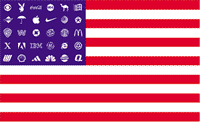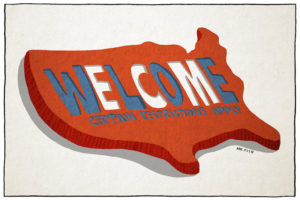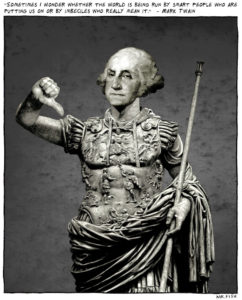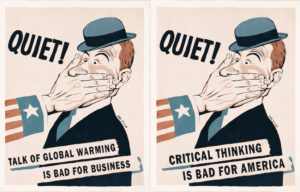The Last Days of Democracy
Truthdig speaks with Elliot Cohen, author of "The Last Days of Democracy," who argues that the United States is in political and cultural decline, with media and telecommunications giants engaged in "a well-organized effort to hijack America."
Truthdig speaks with Elliot Cohen, author of “The Last Days of Democracy,” who argues that the United States is in political and cultural decline, with media and telecommunications giants engaged in “a well-organized effort to hijack America.”Click here
to listen to this interview.
Transcript:
James Harris:
Welcome to another edition of Truthdig. This is James Harris sitting down with Josh Scheer. On the phone we are talking to Elliot Cohen, the author of “The Last Days of Democracy.” Elliot, let’s start with your theory. For the most part, you’re saying that our government in the United States is coming to an end. And that we are headed toward a dictatorship, toward authoritarian rule. The idea that we will one day be like Nazi Germany was … is hard for a lot of Americans to swallow. Why do you believe it to be true?
Elliot Cohen: We are not saying things off the top of our heads; we do have the operations and secret prison camps in Europe, we torture prisoners in Abu Ghraib and Gitmo. This regarding the Geneva Conventions and the NSA spying programs warrantlessly. Bush is issuing signing statements, which is tantamount to nullifying congressional lawmaking powers. Cancellation of habeas corpus, enabling individuals as enemy combatants just by virtue of whether the president deems that hostile to U.S. interests. I mean this goes on and on for individual facts as to why one might say that America is becoming a dictatorship. And as far as the issues of the media and how the media is being controlled, I think there’s many insiders who admit the same facts that I’ve stated, in fact, they come from such — , I mean, the issue here is not that the media is somehow an ideologue in cahoots with the government for ideological purposes. It’s rather that the media is a moneymaking machine and is being controlled by the purse-strings — through the government.
Josh Scheer: Now, aren’t there good people in the media who are trying to do something? Are they wimpy? Or are they not speaking loud enough? What do you think is the cause of the problem with the media?
Cohen: Well, the cause of the problem isn’t the good journalists who are in the trenches and risking their lives to get out stories. They’re still there. What happens is when the news is edited, what facts that are damaging to government, the censorship kicks in. And the stories just don’t get out there from the mainstream. And, so, it’s not that it is a sense of wimpiness of individuals who are risking their lives. I think there needs to be a realization, however, that is it really worth risking your life when the story is going to be cut, edited, censored, in a way that the news isn’t going to get out. And so it’s not at the lower levels of journalists in the trenches; it’s the higher levels of editorship and ownership where — I mean there’s a lot of reasons for this. First of all, when you look at the media and its interests, its bottom line is its major interests. And how does it attain its bottom line? Well, it does it through military contracts, for instance. Because these companies are not just newsrooms, they are giant conglomerates. Take, for interest, General Electric. General Electric has interests in producing jet engines for military contracts with Lockheed Martin. And the war in Iraq is something that builds up these revenues, and when it comes to advancing the media ownership, how many cross-ownership markets and how far can you advance your national market? Well the FCC is the one that grants those wishes and … so there’s lots of reasons why, not withstanding tax incentives and other little government perks, why the media would be beholden, you know, to the politicians who hold the reins of government. And when you have such an aggressive government as we do, which is ideological and has this desire to control and amass great power, then you have really a recipe for dictatorship. And that’s what we have: We don’t have an independent Fourth Estate doing its job. And we have problems there.
Scheer: That’s what I’m talking about. When I say wimpy, I don’t mean obviously the person in Iraq trying to cover for Indymedia. I’m talking about those people in power who are editors, who are publishers, who are the owners, shouldn’t they have some kind of standard, because they are the Fourth Estate, speaking truth to power … ?
Cohen: The way things are going is they’re thinking as corporate executives and not journalists. They’re thinking about their obligations to their shareholders; they’re thinking about their bottom line. And that kind of thinking is incompatible with the Fourth Estate that’s independent of government — not when you’re in business with the government. One of the major problems as far as the media is concerned is media consolidation and these large corporations that control the media being not these good journalists of the Fourth Estate, but rather simply businessmen trying to make a profit.
Harris: I was reading something you said about the Internet and of course it’s at least in one respect the ability of alternative press to be heard and seen by others who wouldn’t normally see it. You say the regulations we’re seeing right now are just one example of the way we are being stripped of our democracy, our, at least an access to continuing democracy. Explain that.
Cohen: The Internet is really a great bastion of democracy. If we didn’t have the Internet we wouldn’t even know about the Downing Street Memos, for example. Because the mainstream didn’t cover it. And so what we’re up against is, if we can hold on to the Internet, then we still have a source of a democratic press. But the problem is, it’s being encroached upon just like mainstream media and it’s in danger of becoming really an arm of these large corporations who are now dominating the Internet. And this started in 2000, well, well before. But in 2005 there was the landmark decision by the Supreme Court, which was the Brand X decision, where the court essentially turned over the pipes that send the information down the Internet to these large corporations. It basically said that they own the conduit for the Internet. The Supreme Court ruled that the Internet is like a cable TV station and can be owned and can be operated like such. For instance, Fox broadcasts its program and you have no control — we have no control over what it broadcasts. Well, essentially, this is the way the Internet is now conceived, legally. They can send and control, you know, send things down and control the content. And if they can control the conduit, they can control the content of the Internet pipes. And even wireless there are these fights to try to hold on to control of the Internet, and that’s the first stage to do away with what’s common carriage, which means that just like on a phone conversation, anybody can enter a phone conversation and use the phones. Well, the Supreme Court said that that is no longer the case with the Internet. The Internet is now — . The Net’s not going to be seen as a telecommunications system but rather it’s going to be conceived as an information system just like CNN or Fox cable. And what that does is open up the door effectively for various modes of control, and one of the ways in which these large corporations like Comcast are trying to control the Internet right now is through setting up these tollbooths where they are instituting, or want to institute — and there’s a lot of powerful lobbies in Congress to try to do this — they are trying to set up these tollbooths which will regulate how much, what kind of bandwidth different Internet sites can have, depending upon how much they are wiling to pay. So we have a pay-for-play system where the bandwidth will determine how quickly you connect then, and whether or not you end up spinning out in cyberspace versus reaching lots of people. And obviously those corporations with the deepest pockets are going to be able to have the best connectivity. What that means is money is going to control truth.Harris: Why don’t we hear about this legislation? Why don’t we hear about these efforts to control the Internet, to control wireless? Is this part of the systematic effort you are talking about?
Cohen: Yes, I believe that that’s the case. Just to preface this in 2007, I won the Project Censored award for my article on the corporate takeover of the Internet. And the reason why I did was because Project Censored thought that it was the most censored story of — it actually goes back to 2005 when the decision I mentioned, the Supreme Court decision, was made. It wasn’t heard at all on the mainstream. And why not? Well, part of the main reason, one of the main reasons, is that these companies really don’t want to blow their cover. I mean, you have all these large corporations having interconnected board members. I mean, they have contracts with each other, they have relationships with each other. And if they don’t want this news covered because it’s dangerous to their prosperity, it won’t be covered. That’s part of it, but the other part of it is even more unsettling. And that’s where we find the government really having an interest in this, and much has been said in the progressive media about the Project for the New American Century, PNAC, but one of the issues of PNAC that hasn’t been broached that much is the problem of the Internet and how that keys into the ideology of PNAC. Basically, what PNAC wants to do is to control the Internet. And they have been very explicit about this and a report called “Rebuilding America’s Defenses” in 2000 — they specifically address this, so I think something about the Project for the New American Century, what its genesis is, before I say something about — .
Harris: I think a lot of people aren’t aware of it, but are becoming, so please help them. …
Cohen: Right, the Project for the New American Century was begun around ’97 or ’98 by a bunch of individuals who ultimately showed up as the officials of the Bush administration. These people like Dick Cheney and even Scooter Libby and [Paul] Wolfowitz and [Richard] Perle and so many others who are controlling the government right now [or were controlling the government]. It even included [Donald] Rumsfeld.
Scheer: Some of them should be in prison, or are in prison.
Cohen: These individuals are now calling the shots for the Bush administration. So we can understand, we can assume that the ideologies espoused by the Project for the New American Century are really the perspectives of the Bush administration. Because they control the Bush administration, including the vice president. And, one of the things, the main interest of the Project for the New American Century, was really to control, to use military might, to corporatize and control the world. I mean, in just plain English. They entertained the idea of taking over Iraq, whether or not Saddam Hussein presented a threat; they were very specific. It didn’t really matter as long as they can get that area and establish a permanent base there, that’s what they wanted. One of the things regarding the Internet that they talked about was the Internet has elements in a global commerce politics and power play. And they said that “any nation,” and this is a quote, “wishing to assert itself globally must take account of this other new global commerce.” And then they went on and said it’s an invaluable tool, they said, “that could provide,” and this is a quote, “America’s military and political leaders,” let me emphasize political leaders, “an offensive,” not just a defensive, “for disabling an adversary in a decisive manner.” And then when they were talking about cyberspace that it maintains that the Defense Department must establish control and provide for the security for the Internet. Now, when you bring in the Defense Department controlling the Internet — tell me if I’m speculating here — is that a recipe for controlling the Internet?
Scheer: Is this a new phenomenon with the government trying to control people? Because it seems that governments have always tried to do that, or is this Bush administration, and this time that we are in, something unique and even further than the Nazis or the communists or the Americans in the ’20s, the ’30s, the ’40s and the ’50s. Is this something that we are seeing right now that is different than the typical government control of its people?
Cohen: Well, if you’re talking about, let’s say, how much control did the Clinton administration exert over the government versus the Bush administration; or if you’re comparing it with the Nazis, that’s a different story. I think there’s a strong parallel between the ways the Nazis proceeded and the way Bush is proceeding. If you look at the distinction between, say, the Clinton administration and the Bush administration, there’s also a difference. It’s to some extent a difference in degree, and in some extent, to some extent, it is a difference in kind. The different in degree is the interest in dealing with the media and engaging in quid pro quo. Certainly, the Clinton administration, which in 1996 signed into law the Telecommunications Act , which gave more control over larger markets to the media, the mainstream — these large corporations — and helped to move along this corporate consolidation. You know, these large corporations gaining, getting larger and larger and controlling more and more of the media. So, I mean, when you have this small group of individual corporations controlling the media, there’s less competition. Even though there are more stations, but, in that case, you know, I know you want to get away from the media, it’s hard to do that here.
Scheer: Well, I didn’t mean to get away from the media, but I meant that in terms of having a conversation about the New American Century and things like that, I know they go hand in hand. I was talking more about Nazis, not about their brutality but their control of the media, or in this country we had the Red Scare in the ’20s and we had McCarthyism, we had the Cold War, where we used fear, we used the media, to kind of control the message. Cohen: And that’s where it comes in now, the difference, it certainly, as I mentioned, the Clinton administration wanted to control the media, as I mentioned. It was involved in that. It engaged in quid pro quo and so forth, but the difference here, and this is the difference in kind, I believe, is the ideology that the Bush administration has and that’s this amassing of power and control, this global domination theme, and this is what it lives and breathes for. Control. And, so, when you have this voracious appetite for control and then you have the media set up to accommodate it, there is a difference here that’s going on between what we’ve seen in America before. And it’s the kind of control and desire for control that’s analogous to what we saw in Nazi Germany. … What’s different about this case is that we have technology that we never had before. If Nixon had more than his little tape recorders, he could do a lot more than he did as well. But you see — .
Scheer: Yeah, I understand. It’s just interesting to look at, say, watch a movie, or read the book, “All the President’s Men,” and go “Nixon’s pretty bad with wiretapping and in terms of election fraud, and corruption, and those types of things”; it seems that it kind of goes in a revolutionary cycle. I want to talk about hope because we had a conversation with somebody the other day and it was talking about how some people don’t hope, and that even [I] have been a little cynical. And I want to talk about your book because at the end you have something called “What’s Now, Compatriots,” and you talk about what you can do as an average citizen, and you put in a selected media guide, even though Truthdig’s not in there yet. …
Harris: We need to talk to you about that.
Scheer: But, I want to know, does that mean you have hope? Do you have hope that this system can be changed or do you think that it’s hopeless and we should just kind of cower and go away?
Cohen: Never cower. Never cower. It’s not over until it’s over, and right now we need to understand that that’s where we’re heading. And it’s easy enough to say, “Well, you know it happened in [Nazi] Germany, but we’re different.” That’s a very pompous attitude. As though Americans are somehow different than Germans. They’re not. They’re people. And if we don’t watch it, this is where we’re heading. Well, what do we do about it? There’s thing we can do. Well, one thing is for the average person to make sure that they’re informed: To stop relying on mainstream media as much as they do, and to get their information from independent media. Then really when you look at the survival of dictatorships, and whether they thrive or not. They thrive on keeping people ignorant. And if the masses of people are just ignorant and they don’t take responsibility for their failure to know, then we aren’t looking in the face of hopeless dictatorship; people need to wake up. They need to start learning about what’s going on and they need to say, “We’re as mad as hell and we’re not going to take it.” They need to join activist movements like, for instance, Free Press , which is an organization that’s been really doing a lot to try to counteract the taking-over of the free Internet and the destruction of Internet neutrality. And a lot of other causes about media … [like] organizing massive letter-writings to Congress. People need to start thinking in terms of doing these sorts of things. Peaceful assemblies. And demonstrations. These are constitutional rights, and as long as we have these rights in our Constitution we should make sure that we see that through. These are things that we need to do. Educators should stop placating and looking for fair and balanced and start speaking out because there’s danger here and every educator has an obligation to step up onto the plate as a vanguard of democracy. The lawyers of this nation, including the American Bar Association, need to present a unified front against violations of the rule of law. They did that at one point where they denounced Bush’s instituting signing statements to do away with the congressional lawmaking authority and they made it clear that it was illegal and unconstitutional. But we need to be more unified as educators as citizens. As journalists too. I think the journalists associations and the schools of journalism need to start making a unified stand that, you know, journalists need to be vanguards of democracy. We need to get back the Fourth Estate, and we can’t simply support these large corporations allowing this go down the tubes and that’s exactly what’s going on. I think we need to take the unified stand. Is it going to happen? Well, you know, people like us, you and your site and the things that I’m trying to do with the book and doing these kinds of interview are the things that more of us need to take seriously. And listen and learn. Is that going to work? Well, I think that we better do that. It’s better than laying down and playing dead.
Scheer: Well, thank you. I just want to talk about Free Press because we have interviewed people from Free Press and it’s not just a liberal-Democrat issue; it’s not just a conservative issue. Because with Net neutrality the Christian Coalition, that’s their new issue they’ve set for this next election for the next many years, so it’s not just a one-sided issue; it’s keeping a free press. Keeping the Internet free, we can all agree, is the thing for the citizen.Harris: … [H]ere’s a question, and Josh speaks to this as well. Elliot, you were talking about PNAC, the Project for the New American Century, and you’re also talking about media and how it’s been manipulated severely in the last seven years. We’ve seen the government exposed; we’ve see the government abuse, that power can be misused. Does this reveal a problem perhaps, a more insoluble one that our government is flawed? That the system that we abide by, the Republic, is flawed? And if so, what do we do about that fact?
Cohen: I think that after they’ve ransacked the Constitution and the balance of powers and the like as they’ve done, it really is flawed. They’ve set some dangerous precedents. Was the system intact when they came in? I think it was. But any system, any system has vulnerabilities. There’s no system of government and no system of any activity or operation that’s entirely invulnerable. I think we have a good system and if we can only get it back and start recognizing the rule of law in implementing it. I think what’s happening is that they are getting away with so many things. I mean, they refused to recognize subpoenas, they evoke executive privilege even with the Tillman case; I mean, this is absurd. They’ve gone to such absurd lengths of just disregarding the rule of law that anybody, no matter how perfect your system was, if they weren’t going to follow the rules then the system wouldn’t work. So I think what Congress needs to realize is just that. They have to take the powers that they do have, they have some powers that they can exercise, but they’re not doing it. I think this is human error. I think it’s with people who are in power right now and the people are trying to do something about it. There’s where the wimpishness comes in. They’re being … the Congress is being wimpish. They need to impeach Bush. They can do that. But they’re not. And it’s not the system’s fault; it’s their fault.
Harris: And isn’t that a sad fact, though? You see [House Speaker Nancy] Pelosi there; you see Sen. [Harry] Reid there. They all seem to be talking the talk but nobody is actually getting anything done. And I think that’s the most upsetting part, as Dr. Cohen just said.
Scheer: Well, I just think that no one is — . As Dr. Cohen said, and previous with people writing letters to Congress, I think that as a citizenry, and I need to do more. I’m sure everyone could do a little more … to let them know that we’re pissed off. And I think that’s why the election [outcome of 2006] happened. The Democrats should learn from that and, you know, any time you get a system that large obviously things are going to fall through the cracks, but they can certainly, they should be responsible with the election and how much the Democrats have raised more than the Republicans. They should learn that the citizenry is upset. …
Harris: Well, here’s one place to start. “The Last Days of Democracy: How Big Media and Power-Hungry Governments Are Turning America Into a Dictatorship.” For Josh Scheer, for Dr. Elliot Cohen, this is James Harris and this is Truthdig.
Your support matters…Independent journalism is under threat and overshadowed by heavily funded mainstream media.
You can help level the playing field. Become a member.
Your tax-deductible contribution keeps us digging beneath the headlines to give you thought-provoking, investigative reporting and analysis that unearths what's really happening- without compromise.
Give today to support our courageous, independent journalists.








You need to be a supporter to comment.
There are currently no responses to this article.
Be the first to respond.